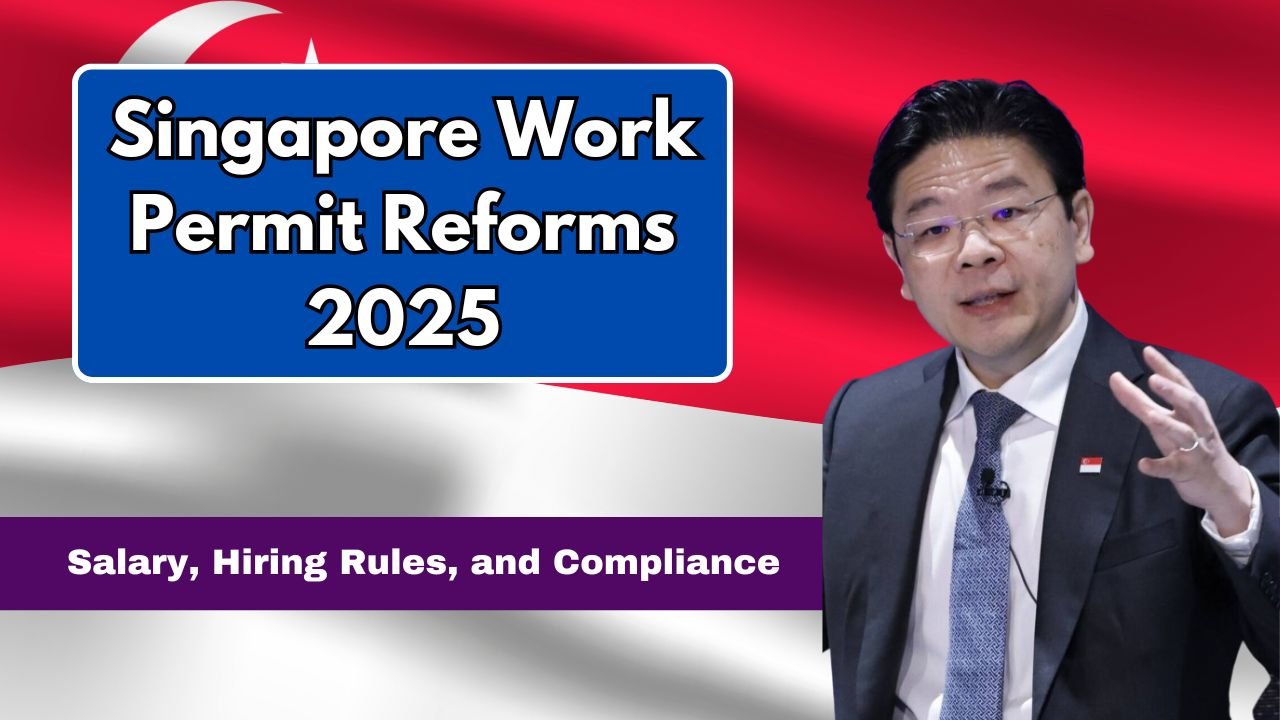Singapore is ushering in a new era of employment regulations through the comprehensive Singapore Work Permit Reforms 2025. This landmark transformation is aimed at refining foreign labor management, ensuring fair hiring practices, and enhancing Singapore’s global competitiveness while prioritizing local employment.
As one of the most progressive updates in recent years, the Singapore Work Permit Reforms 2025 focus on increasing salary thresholds, introducing structured evaluation systems like the COMPASS framework, and reinforcing employer accountability through strict compliance rules. Whether you’re an employer, a foreign professional, or a policymaker, understanding these changes is essential for staying aligned with Singapore’s evolving workforce strategy.
Salary Revisions for Employment Pass Holders
A cornerstone of the Singapore Work Permit Reforms 2025 is the revised salary benchmark for Employment Pass (EP) holders. Beginning January 1, 2025, new EP applicants must earn a minimum of SGD 5,600 per month, up from SGD 5,000. For the finance sector, this rises to SGD 6,200.
To reflect varying career stages, Singapore’s Ministry of Manpower has introduced age-adjusted salary criteria. Mid-career professionals in their 40s must earn up to SGD 10,700 monthly to qualify for an EP, recognizing the value of experience.
Current EP holders will also need to meet these thresholds by January 1, 2026. This transition period gives both employers and employees adequate time to align compensation packages accordingly.
Stricter Standards for S Pass Holders
The Singapore Work Permit Reforms 2025 also reshape the S Pass framework. Effective September 1, 2025, the minimum salary requirement for S Pass applicants will increase to SGD 3,300, and SGD 3,800 for financial services.
In addition, the Tier 1 foreign worker levy will increase from SGD 550 to SGD 650. Tier 2 levies remain unchanged. These updates reflect the government’s intent to shift reliance from foreign labor to local talent and to make the S Pass system more reflective of skill levels and economic needs.
Employers have until September 1, 2026, to transition existing S Pass holders into compliance.
Introduction of the COMPASS Framework
The new Complementarity Assessment Framework (COMPASS) is a major highlight of the Singapore Work Permit Reforms 2025. This point-based system, effective from 2025, applies to all EP applications and promotes transparency and fairness.
Under COMPASS, candidates are evaluated across four categories:
- Salary Competitiveness
- Educational Qualifications
- Workforce Diversity
- Support for Local Employment
To secure approval, applicants must accumulate at least 40 points. Employers with strong hiring records and candidates with exceptional profiles may gain bonus points. This framework encourages companies to adopt inclusive, fair, and forward-thinking hiring practices.
Also Read – New Mahindra Bolero: Rugged Performance, Affordable Price, and Now Comes with CNG Option
Enhanced Fair Hiring Enforcement
The Fair Consideration Framework (FCF) has been fortified under the new reforms. Employers are now obligated to list job openings on the MyCareersFuture portal for at least 14 days before hiring foreigners. Additionally, they must provide justification for rejecting local candidates.
Repeated failure to consider local talent could land companies on the Ministry of Manpower’s watchlist, delaying or even blocking future work pass applications. This step reinforces the message that hiring foreign professionals should complement, not replace, the local workforce.
Phased Implementation Timeline
To ease the transition, the Singapore Work Permit Reforms 2025 come with staggered deadlines:
- Jan 1, 2025: New EP applications must meet updated salary criteria.
- Jan 1, 2026: Existing EP holders must comply with new salary thresholds.
- Sep 1, 2025: New S Pass salary and levy changes take effect.
- Sep 1, 2026: Existing S Pass holders must fully transition to new standards.
These timelines allow both employers and employees to plan effectively, audit HR systems, and align hiring strategies with regulatory changes.
Impact on Foreign Professionals and Employers
The Singapore Work Permit Reforms 2025 elevate the bar for foreign employment, signaling that only top-tier professionals with competitive compensation and skills will qualify. For foreign workers, this is a call to upskill, stay relevant, and align career goals with long-term employability in Singapore.
For employers, the reforms mean higher hiring costs, greater accountability, and more rigorous processes. Transparent and equitable hiring systems must be adopted to ensure compliance and to attract global talent that genuinely adds value to the local ecosystem.
Specialized Work Passes Still Open
Despite stricter criteria, Singapore remains open to exceptional global talent through specialized passes:
- Tech.Pass: For high-performing tech entrepreneurs and investors.
- ONE Pass: For globally recognized professionals earning SGD 30,000+/month.
- PEP (Personalised Employment Pass): For high-income professionals offering flexibility across jobs.
These pathways ensure Singapore continues attracting the best while maintaining fairness for local workers.
A Vision for a Fair and Sustainable Workforce
The Singapore Work Permit Reforms 2025 reflect the country’s vision of building a sustainable and inclusive labor market. By prioritizing fair pay, transparent evaluations, and stronger support for local employment, these reforms aim to strike a balance between global competitiveness and local empowerment.
Frameworks like COMPASS and FCF establish clear rules, allowing data-driven decisions that align with national economic goals. Employers are encouraged to invest in local workforce development, embrace diversity, and prepare for a future that prizes both talent and equity.
As Singapore charts its course toward a resilient and high-quality workforce, the Singapore Work Permit Reforms 2025 will serve as a crucial blueprint for shaping tomorrow’s employment landscape.
Some Important Link
| Download News APP | Click Here |
| WhatsApp Group | Click Here |
| Home Page | Click Here |
